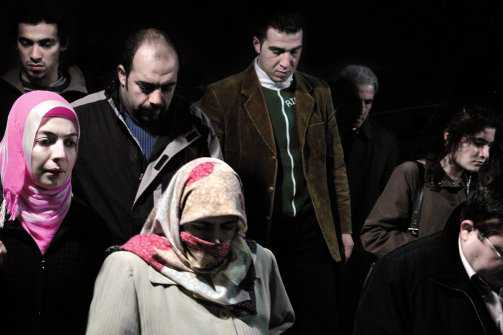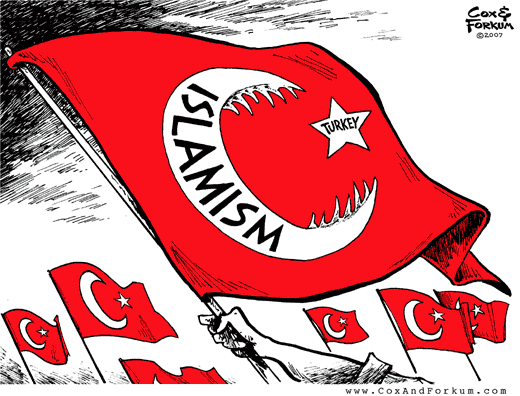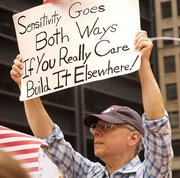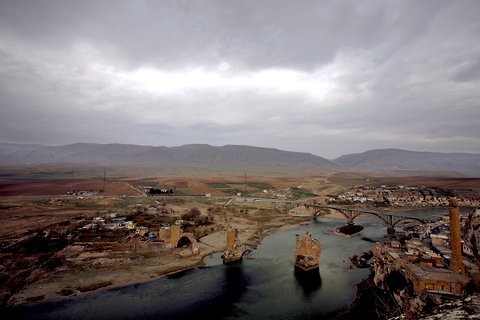A look at some of the more interesting views spouted by Turkey’s political and cultural leaders
Turkey’s Islamists are obsessed with sex, and no one typifies this obsession more completely than Prime Minister Recep Tayyip Erdogan. Erdogan isn’t shy about meddling in private lives, promoting an Islamic way of life in hopes of raising a “religious generation.”
What do you think about the sex lives of the Turkish? Tweet to us!
He regularly encourages families to have “at least three children” and avoid C-section births. He’s also the first politician in Turkey’s history to openly take an anti-abortion stance. Most recently, he spoke about theperils of coed living—in college dorms and private apartments.
Turkey’s President Recep Tayyip Erdogan never passes up a chance to dispense religious advice.
But Erdogan isn’t the first Islamist in Turkey to constantly cause controversy with his remarks on the lifestyle choices of his citizens. In fact, it’s a popular topic frequently visited by his fellow Islamist thinkers. Below, some of Turkey’s most eye-opening stances on sex and equality:
“I Offered Another Friend to My Husband”
 Sibel Üresin is totally cool with polygamy.
Sibel Üresin is totally cool with polygamy.Sibel Üresin, a self-dubbed Islamist life coach who rose to fame—and notoriety—in Turkey with her provocative statements on women’s issues. A vocal advocate of polygamy, her sentences speak for themselves:
• “Rich men with solid careers and lots of sexual power can sometimes choose polygamy. No woman would ever become the second wife of a poor man. Men chase women who are more flirtatious, laugh more and who can satisfy them sexually. If I were a man, I would have been polygamous,” she said in May 2011.
• “I offered a single friend of mine to my husband. ‘If you liked her and also want to marry her [as your second wife], it’s OK with me,’ I told him. But he didn’t accept my offer. Even if he did, I wouldn’t have divorced him,” she said in July 2012.
• “Women talk ceaselessly. It is the woman’s fault if she is killed. Really, I know some women that never shut up. It is very normal that her husband’s going to go crazy,” she said in May 2013.
It’s Acceptable to Marry Your Adopted Kid
If Woody Allen were a Muslim, perhaps his marriage to Sun-Yi Previn wouldn’t be that big of a deal. While Turkish law currently prohibits marrying your adopted child, the issue has been hotly debated within Turkey’s Presidency of Religious Affairs, a government branch that provides and regulates religious services in the country. In 2007, İsmail Karagöz, an Islamic scholar and member of the council, said, “When the adopted kid grows up, he or she becomes a stranger to the parent.” In other words, it is acceptable, according to Islam, to marry your adopted child.
Father-to-Son Penis Transplants
The Presidency of Religious Affairs deemed organ transplants to be not only religiously acceptable, but also crucial. Yet, its statement didn’t satisfy one Islamist writers who argued against the idea that the bodily organs won’t matter when Judgment Day comes.
Mevlüt Özcan, the ultra conservative writer for Milli Gazette, an Islamic daily, offered this mind-boggling scenario as a rebuttal, just last week:
“Let’s think for a second that a husband’s sister’s genitalia is transplanted to his wife? It’s a very dangerous situation. The same applies to men. What will happen when a father’s [penis] is attached to the son’s body? How will that son approach his own wife? Who will be responsible for that organ’s sins?”
76-Year-Old Writer and a 14-Year-Old Girl
The Turkish daily Yeni Akit is an advocate of Islamic law, with a track record of anti-Semitism, anti-secularism and anti-modernism.
 Hasan Karakaya is a religious newspaper man with an edge.
Hasan Karakaya is a religious newspaper man with an edge.Although its circulation is low, its provocative stories cause a lot of negative buzz. The paper’s editor-in-chief, Hasan Karakaya, is regular fixture inside Erdogan’s inner circle and accompanies him on state visits. Yeni Akit also has a tainted history of hiring sex offenders as columnists. One of them is Hüseyin Üzmez.
In 2009, he was charged with sexually abusing a minor and sentenced to 13 years in prison. The 76-year-old Üzmez had been arrested on charges of having a sexual relationship with a 14-year-old girl, with her mother’s knowledge. “A girl who has reached puberty, who’s having periods, is of age according to our beliefs,” he once said.
But hey, older men with teenage girls isn’t so radical considering current President Abdullah Gül, now 63, was 30 when he married Hayrünnisa Gül, when she was 15.
 Abdullah Gul and his wife, Hayrünnisa, have been together since she was 15. Here they are with the leader of Norway and his wife.
Abdullah Gul and his wife, Hayrünnisa, have been together since she was 15. Here they are with the leader of Norway and his wife.Pregnant Women Should Just Stay Home
During the month of Ramadan this summer, a religious scholar named Ömer Tugrul Inancer appeared on the state-owned TRT network and claimed that it is immoral for pregnant women to appear in public. “They should not walk around on the streets with huge bellies,” he argued. “First of all, it’s not aesthetic. It’s disgraceful, it’s immorality.”
When his remarks caused an outrage among Turkish women, Inancer stood by his words: “[Getting pregnant] can not be the reason to swing your belly. What don’t you understand, it’s not aesthetic…. That’s why young girls are scared of giving birth.” Oh, he also added that maternity leave was for women to “stay at home, not wander around.”
In another TV appearance in September, Inancer argued this time that “working women cause marriages to fall apart.” He explained, “Women serve their bosses, instead of their husbands.”
The Coed Campus That Nearly Derailed a Minister
Founded by Americans in 1863, The Bosphorus University has one of the most attractive campuses in the Turkey. Its grassy spaces are packed with students on sunny days. However, the site of young men and women together was too much to handle for Turkey’s current Minister of Transport, Maritime Affairs and Communications Binali Yildirim.
During a speech in late January, he said: “Somebody told me about Bosphorus University, the many opportunities the school provides, such as employment in the States after graduation. I became confused and visited the campus. It was a different world there, as if entering a different country. Even the buildings were unique. And then young people, girls and boys together, were sitting on the lawn! I was shocked. ‘I will go off the road here,’ I thought.”
Since then, #boysgirlstogether has become a popular Twitter hashtag and a running joke among Turkey’s millennials.
Gender Equality Leads to Third Gender
The conservative writer Ali Bulaç, whose work appears in the Turkish daily Zaman, a paper with more than 1 million subscribers, once claimed that gender equality is “ruining this world” and “women are becoming more like men.”
He believes that a woman’s primary duty is to raise children and stay at home. He also believes that gender equality causes homosexuality: “If you try to upend male-female relationship with affirmative action or gender equality, you cause the families to dissolve, sexual deviances to occur and pave the way for the third gender.”
AUTHOR: Oray Egin





